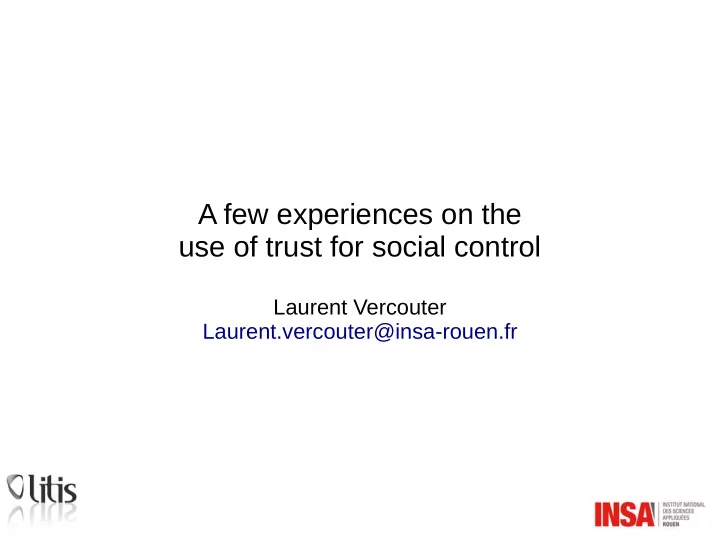

A few experiences on the use of trust for social control Laurent Vercouter Laurent.vercouter@insa-rouen.fr
● W h a t i s t h e u t i l i t y o f a s o c i a l c o n c e p t f o r s e l f - organizing systems ? ● What is required for its implementation ? ● How can/should it be adapted to specific application contexts ? 3 e x a m p l e s u s i n g t r u s t f o r s o c i a l c o n t r o l P2P networks social networks sensor networks
1st case : Social control for P2P Observation Observation Sanction Expectation Sanction Expectation Evaluation Evaluation Observation = messages ● Expectations = norms + ● violation detection Evaluation = Trust calculation, ● gossiping, ... Sanction = re-wiring, ● ostracism * Vercouter & Muller, « L.I.A.R.: achieving social control in open and decentralized multiagent systems », Applied Artificial Intelligence, 24 :723--768, September 2010
2nd case : Privacy preservation in a social network Observation Observation Sanction Expectation Sanction Expectation ● Users are connected in a social network and Evaluation Evaluation exchange information, that may be private or sensitive ● Privacy preservation is an issue ● Users should be assisted to protect their own privacy and to prevent them from violating others' privacy
2nd case : Privacy preservation « We have a right to privacy, but that is neither a right to control personal information nor a right to have access to this information restricted. Instead, it is a right to live in a world in which our expectations about the flow of personal information are, for the most part, met; (...) This is the right I have called contextual integrity, achieved through the harmonious balance of social rules, or norms, with both local or general values, ends and purposes. » (H. Nissembaum)
Contextual integrity for social networks M a p p i n g f o r P r i v a c y Enforcement Agents (PEA) Organisational model 1) T r a n s m i s s i o n c o n t e x t m a t c h e s t h e nature of information 2) Recipient is part of the transmission context 3) Agents do not have incompatible relationships with the target 4) Privacy policies defined by the information subjects are satisfied Trust model Social relation model
Contextual integrity for social networks Obstacle, problems, opportunities... ● Expectation : ● Organisational/social models are only approximations ● Privacy violations can be detected but should be confirmed Observation Observation ● User involvement is essential to deal with subjectivity ? ● Many conflicts appear Sanction Expectation ? Sanction Expectation ● Sanction Evaluation Evaluation ● Users have to keep the control ● No automatic re-wiring ● PEA assists users to prevent privacy violations ● Explanations are essential ● Trust = privacy preserving behavior of an entity * Krupa and Vercouter. « Handling privacy as contextual integrity in decentralized virtual communities : the PrivaCIAS framework ». Web Intelligence and Agent Systems, 10(1) :105--116, 2012
3rd case : Social control for sensor networks O b s t a c l e , p r o b l e m s , o p p o r t u n i t i e s . . . ● O b s e r v a t i o n : ● Overhearing is an opportunity ● N o i d e n t i t y m a n a g e m e n t ! ● Shift to consider trust in neighborhood ● Evaluation ● Trust calculation ● Almost binary (full trust or distrust) ● Distrust → backup mode (sensing only) → contribute to a quarantine M A N E T s : ● Nodes mobility ● Nodes with 2 roles : sensing ● A justification to integrate forgiveness ? and routing Observation Observation ● Resource limitations (energy, Sanction Expectation Sanction Expectation memory, communication) ? Evaluation Evaluation * Vercouter and Jamont. « Lightweight trusted routing for wireless sensor networks », Progress in AI, 1(2) :193--202, 2012
What can we learn from these experiences ? Can we find a « methodology » for mapping a social concept, such as trust, to technical systems ? Are there invariants ? Essential characteristics ?
Recommend
More recommend